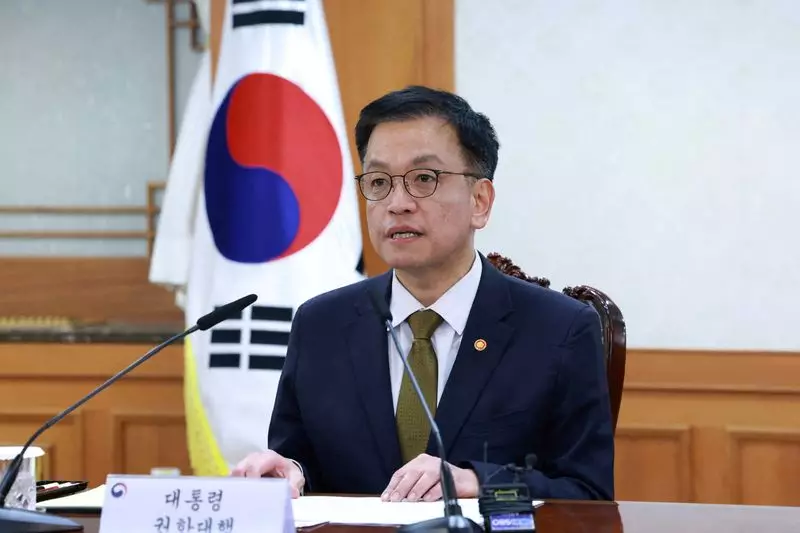In a time of political upheaval within South Korea, Acting President Choi Sang-mok has underscored the crucial nature of diplomatic relations with the United States under President Donald Trump’s second term. Choi’s assertions reflect a concerted effort to stabilize bilateral ties amidst growing concerns over U.S. policies that threaten to impact the Korean economy. The complexity of the situation is magnified by South Korea’s own internal turbulence, which has positioned the nation at a potentially vulnerable juncture in its foreign policy.
Choi’s comments, made shortly after Trump’s inauguration, signal a desire for a more reciprocal relationship with Washington. Using the slogan of the Korea-U.S. alliance, “We Go Together,” Choi emphasizes the need for cooperative policy measures that seek mutual benefits. The history of the Korea-U.S. alliance forms a vital backdrop for understanding how both nations can navigate these rough waters. Choi’s proactive stance suggests recognition of the significant implications that U.S. policy shifts can have, especially given South Korea’s position as the fourth-largest economy in Asia.
Since taking office, Choi has been managing the fallout from significant recent political events, including the impeachment of key figures such as Prime Minister Han Duck-soo and President Yoon Suk Yeol. His role as acting president is critical as South Korea attempts to recover from what many are calling one of its worst political crises in decades. In this context, Choi has signaled his intention to reach out to Trump as an initial step to reaffirm the all-important alliance while expressing concerns over the potential ramifications of Trump’s domestic policies on international trade and defense expenditures.
In this politically charged atmosphere, the need for a robust diplomatic discussion between South Korea and the U.S. cannot be overstated. The lack of direct communication between Trump and South Korean officials like Han and Choi, especially when compared to China’s diplomatic initiatives, accentuates the diplomatic disadvantage South Korea faces. As articulated by experts such as Leif-Eric Easley from Ewha University, South Korea must quickly address its position in light of these comparative dynamics.
Trade considerations are at the forefront of the dynamics between the two nations, particularly given the looming uncertainties surrounding tariffs and electric vehicle regulations. Choi’s administration is keenly aware of the implications of Trump’s potential trade curbs, as South Korea reported a record-high trade surplus of $55.7 billion with the United States in 2024. The prospect of increased tariffs, particularly on automotive and electronic exports, raises alarm bells for South Korean industries that are heavily reliant on the U.S. market.
Increased scrutiny regarding defense spending also poses a significant challenge for the administration. Given Trump’s previous insistence that South Korea should increase its share of defense costs for the approximately 28,500 U.S. troops stationed on the peninsula, there exists a palpable concern that financial commitments may face new renegotiations. This could exacerbate geopolitical pressures amid continuing threats from North Korea, further complicating the bilateral relationship that has been carefully cultivated over decades.
The volatility of financial markets in response to the Trump administration’s policies serves as a barometer of the broader economic impact that U.S. decisions can have on South Korea. The immediate reaction to Trump’s suggestion of imposing tariffs rolling through the market led to fluctuations in the KOSPI index and erasal of gains that might have otherwise buoyed investors. Such fluctuations underscore the fragility of the South Korean economy, which is intrinsically linked to American policies.
As South Korean businesses brace for potential challenges, sectors such as electric vehicle manufacturing experience immediate repercussions. For instance, companies like LG Energy Solution saw declines in stock value due to the impending changes in government subsidies. In contrast, sectors that may benefit from Trump’s focus on manufacturing and shipbuilding experienced an uptick, illustrating the complex landscape of opportunities and challenges that South Korean industries must navigate in a new geopolitical climate.
As the Trump administration settles into its second term, South Korea stands at a crossroads, requiring not only a sustained alertness to shifting policies but also a strategic diplomatic engagement that reinforces its vital alliance with the United States. The path ahead is fraught with challenges, yet it is clear that proactive leadership and a commitment to collaboration will be essential for South Korea to not only weather the storms of internal upheaval but also to thrive amid external pressures. With a careful approach, South Korea can potentially harness its robust relations with Washington to ensure economic stability and national security in an evolving geopolitical landscape.

